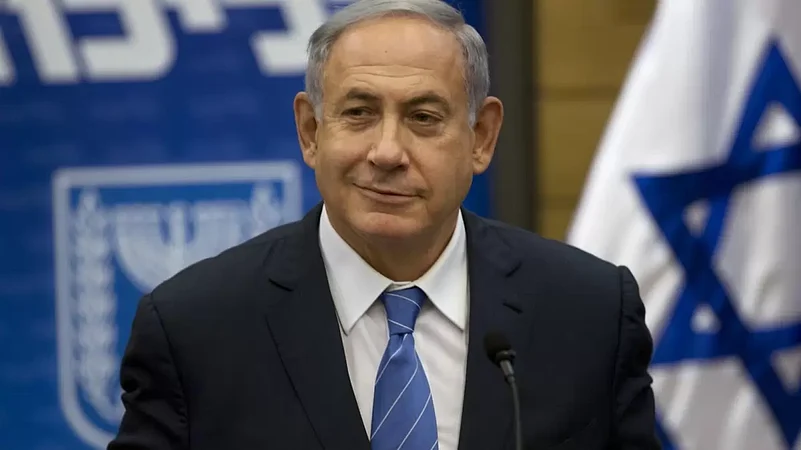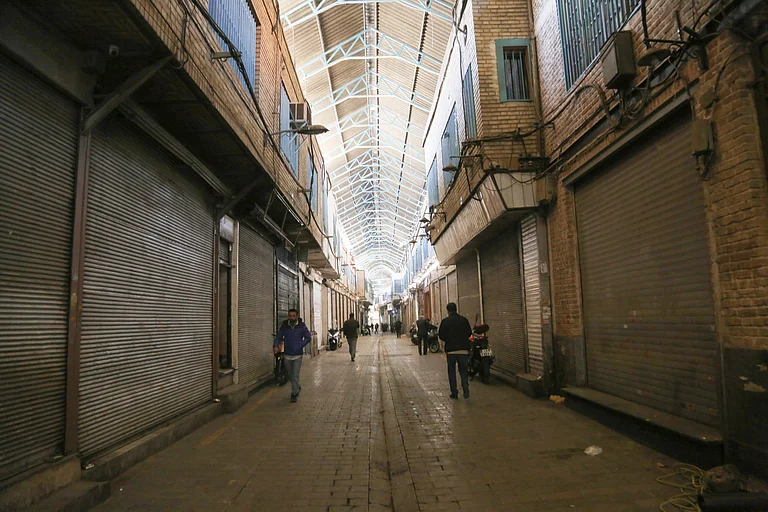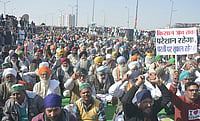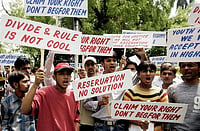Benjamin Netanyahu was on Thursday sworn in as the Prime Minister of Israel.
This is Netanyahu's sixth tenure as the Prime Minister of Israel. He is also the longest-serving Prime Minister, leading the Israeli government earlier during 1996-99 and 2009-21.
Netanyahu's new government has raised concerns among the Palestinians and observers of Israeli politics as the coalition is being considered the most hardliner in Israeli history.
Netanyahu has the support of 64 of the total 120 members of Israeli parliament, called Knesset. Of the 64 MPs, Netanyahu's Likud Party has 32 MPs and the rest are from coalition partners, including the ultra-orthodox Shas, United Torah Judaism, the far-right Otzma Yehudit, Religious Zionist Party, and Noam.
Israel has been dealing with a near-perpetual political crisis for the past four years as governments have been very unstable in the absence of any one party winning simple majority. The recently-held Israeli elections were the fifth general elections in less than four years. The ideologically diverse coalition built by Netanyahu's predecessors Yair Lapid and Naftali Bennet collapsed earlier this year when partners walked out and suspended cooperation.
Long negotiations over government-formation
Despite a clear mandate for the right wing to form the next government under Netanyahu, the negotiations between the coalition partners came down to the wire with the emerging bloc having to pass a flurry of legislation to satisfy the demands of the partners even before the government could be sworn in.
The Knesset passed laws sponsored by incoming coalition parties enabling Shas party leader Aryeh Deri to become a minister despite a recent conviction and suspended sentence.
Other legislation changes include quasi-constitutional basic law which enables the Religious Zionist Party's leader Bezalel Smotrich to be appointed as an independent minister in the Defence Ministry in charge of West Bank settlements, which forms his key voting constituency.
A third bill granted greater control over police to the newly formed National Security Ministry, set to be helmed by far-right Otzma Yehudit leader Itamar Ben Gvir, who has been convicted multiple times for incitement, racism, and terror-related offences.
The parties included in the government had run in the elections with a clear understanding that the Likud party Chairman Netanyahu would lead the next government if they were to get a majority, but they drove a hard bargain with Netanyahu to secure gains.
Concerns over new Netanyahu government
Netanyahu's coalition partners drove a hard bargain in securing far-reaching policy and appointment concessions that will drive judicial reform, may change security service command structures, retroactively legalise and expand settlements, introduce far-right influence in secular education, and expand religious influence over state and social institutions.
Critics have raised concerns that the expected changes could impact the fundamental character of Israel's polity leading to changes that could harm Israel's internal cohesion, risk putting its delicate ties with the world Jewry in jeopardy, and also put the country at the receiving end of international condemnation due to its hardline position on the long-standing acceptance of a two-state solution to resolve the Israel-Palestinian conflict.
The new government where the right-wing Likud party comprises the left-most flank of the coalition is a major shift from the previous one which for the first time in Israel's history had not only parties drawn from the Left, Right, and Centre, but also enjoyed the support of an Arab party.
Concerns have been raised in the United States too, but President Joe Biden's administration has said it would continue to support Israel and that the US-Israel relationship is at its strongest at the moment.
The issue of most immediate concern is the proposed expansion of Israeli settlements of the West Bank.
Reuters reports, "For Palestinians, Netanyahu's line-up has darkened an already bleak outlook. After a year in which violence has surged across the West Bank, Jewish settlements are now set to expand on land on which Palestinians hoped to build a future state.
"Netanyahu's conservative Likud party said the government would 'promote and develop settlement' in territory to which 'the Jewish people has an exclusive and unassailable right'."
Netanyahu's government and US-Israel relationship
Earlier this month, US Secretary of State Antony Blinken said the US-Israel relationship "has never been stronger than it is today".
VOA News reported, "Blinken said the Biden administration would engage with Netanyahu's government based on its policies and not on personalities, including potential senior Cabinet ministers who have expressed vehement anti-Palestinian and anti-Arab views in the past."
However, it quoted Blinken as saying that the Biden administration will not support policies marginalising Palestinians or making two-state solution difficult.
He said, "We expect the new Israeli government to continue to work with us to advance our shared values. We will engage the government by the policies it pursues, rather than individual personalities."
In a separate development, 300 US rabbis in a letter said Netanyahu's government could do "irreparable harm to the Israel-Jewish Diaspora relationship".
"When those who tout racism and bigotry claim to speak in the name of Israel, but deny our rights, our heritage, and the rights of the most vulnerable among us, we must take action. We must speak out," said rabbis in a letter, as per The Hill.
Another report said the Biden administration might boycott the extremist colleagues of Netanyahu.
David Makovsky of the Washington Institute for Near East Policy told NPR that the Biden administration will likely refuse to engage with leaders such as Itamar Ben-Gvir.
He said, "I think the U.S. is likely to boycott him. I have reason to think that they are strongly considering this. Having someone who's going to, I fear, play with matches, given this flammable piece of real estate, I think is a real danger. I think [Netanyahu is] going to be swimming upstream if he feels that he's going to be able to normalize the position of Itamar Ben-Gvir."
How has Palestinian Authority reacted?
The Palestinian Authority (PA) has slammed the agenda of the incoming Netanyahu-led Israeli government, which calls to expand settlements in the West Bank, as a "dangerous escalation".
“These guidelines constitute a dangerous escalation and will have repercussions for the region," said Nabil Abu Rudeineh, spokesman for PA President Mahmoud Abbas.
Abu Rudeineh emphasised that Israel must realise that without complying with the UN resolutions “nothing will be achieved and that there will not be any settlement left on the lands of the independent state of Palestine”. He also called upon the US administration “to turn its words into deeds since it is committed to the two-state solution, without which there will be no stability in the region”.
Meanwhile, hundreds of Israelis protested outside the Knesset in Jerusalem against the incoming government as Netanyahu addressed the parliament in a charged atmosphere, being repeatedly heckled by opposition members.
Hebrew media outlets estimated that some 300 people were participating in the rally organised by centre-left organisations.
Netanyahu on Israel's righward shift, Arab-Israeli peace
Netanyahu has said the "territory of peace" of formula adopted so far has failed. Citing examples of Gaza and Lebanon, he has said wherever Israel ceded territory with hope for peace, Israel only got rockets.
"Because people tired of the idea of territory for peace and we gave territory and we didn't get peace. We got territory for terror. We got out of Gaza and we got Hamas, which is an Iranian proxy. We got out of Lebanon and we got Hezbollah, which is an Iranian proxy. From both Gaza and Lebanon, we've had roughly 20,000 rockets fired into Israel," said Netanyahu in an interview with Washington Examiner.
As for the future of his incoming government, Netanyahu said he looks forward to peace with Saudi Arabia and the end of the Arab-Israeli conflict.
He told Examiner, "But the next step would be an extraordinary leap because it would effectively end the Arab-Israeli conflict, not the Palestinian-Israeli conflict but the Arab-Israeli conflict, and that is, of course, peace with Saudi Arabia.
"And I believe we can get peace with other countries as well if we do that. It's up to the Saudis. It's their decision. But I think that that is one of the goals that I see. Stop Iran, expand the circle of peace beyond our wildest dreams, and continue developing Israel as the innovation juggernaut of the world."
Netanyahu also indicated openness to broader cooperation with the surrounding Arab world, laying out a number of common interest, chief among them being Iran.
"Because of the rise of Iran's power and the rise of Israel's power, Arab countries began to look differently at Israel, not as their enemy but as their indispensable ally against Iranian aggression, which threatens them as well, and also as a source for crucial innovation in areas like energy, water, medicine, you name it, because Israel is a juggernaut of innovation," said Netanyahu to Examiner.
In this comment, Netanyahu also de-hyphenated the Arab and Palestinian conflict.
Even though Netanyahu looks for peace with the Arab world, it cannot be ignored that the the Israel-Palestinian tensions were the highest this year since 2006. So far, at least 28 Israelis and 140 Palestinians, including terrorists and militants, have been killed this year.
Besides the Israel-Palestinian clashes in Jerusalem and West Bank, the Israel and Gaza also fought a brief war this year.
Hamas and other groups such as Palestinian Islamic Jihad (PIJ) had been quiet since August when Israel and PIJ fought a three-day war before eventually reaching a ceasefire.
Benjamin Netanyahu and India-Israel relationship
Benjamin Netanyahu is believed to be a strong advocate of India-Israel relationship. He is also said to have a good rapport with Prime Minister Narendra Modi.
With Netanyahu's comeback, India-Israel strategic ties are likely to see an upward trajectory, and even witness an increased hype around it.
In 2017, Modi became the first Prime Minister of India to visit Israel. The ‘chemistry’ between the two leaders became the subject of intense discussion during the visit. Netanyahu accompanied Modi 'like a shadow' during the visit and extended to him the welcome reserved for the US President and the Pope. The famous picture of the two leaders at the Olga beach, standing facing each other barefoot, had the social media buzzing with talks of ‘bromance’.
Outlook earlier noted, "India and Israel elevated their bilateral relations to a strategic partnership during Modi's visit to Israel. Since then, the relationship between the two countries has focused on expanding knowledge-based partnership, which includes collaboration in innovation and research, including boosting the 'Make in India' initiative."
(With AP inputs)


























